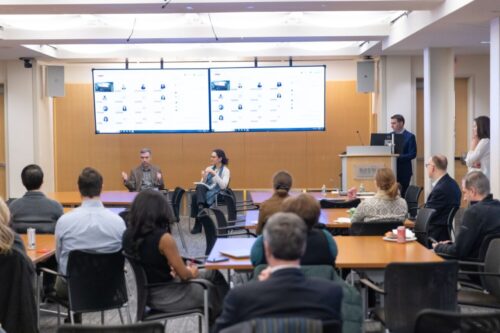The Push for Nurse-Led Research Elevates Vital Voices in Patient Care
March 27, 2025
By Gina Mantica

Photo Courtesy of Manu Thakral
Manu Thakral, NP, PhD
Nurses spend the most time with patients, yet their insights are often overlooked in shaping healthcare innovations. Meet the BMC nurse scientist leading the charge to change that—advancing research, empowering frontline nurses, and transforming patient care.
In the healthcare field, nurses are the providers who spend the most time with patients, yet their perspectives and experiences are underutilized in shaping interventions that could improve patient outcomes. When it comes to research, for example, nurse scientists, or nurses with doctoral degrees, make up less than 1% of the nursing workforce. The role of nurse scientists in the hospital setting is to advance evidence-based practices through their research and to publish their findings for broad dissemination and application.
A research-oriented institution, Boston Medical Center (BMC) understands the negative implications of leaving nurses behind in cutting-edge discoveries. That is why, in 2024, BMC hired its first nurse scientist, Manu Thakral, NP, PhD. Thakral earned her doctorate in Nursing from the University of Massachusetts Boston in 2015, with a focus on population health. She has extensive knowledge in datasets and reporting, and here at BMC, she is using electronic health data to evaluate, optimize, and deploy innovative care models and assess their effect on population health.
HealthCity sat down with Thakral to discuss her research and how her work is shaping the future of patient care.
HealthCity: What inspired you to pursue nursing research?
Manu Thakral: I grew up in the healthcare system as a person with a disability who uses a wheelchair. I knew I wanted to change the things that I felt were not working. I decided to become a nurse practitioner, but it wasn’t an easy road. I had to convince the nursing school to give me a chance because I didn’t meet the physical requirements for nurse training. My accommodation was another person, so I wasn’t judged based on what I could do, but rather my ability to direct someone to do it. I feel proud that the school has since changed their handbook to focus on critical thinking skills rather than physical tasks as requirements for admission.
After I graduated, I was eager to make positive changes in the healthcare system at large. To do so, I felt that that pursing a PhD would best position me to do so, and I did. Now I feel like I’m right where I need to be.
HC: What is the goal of your current nursing research project?
MT: In my role as a nurse scientist, my initial goal is to develop resources to educate and inform frontline nurses about scientific research, while guiding them to pursue their ideas based on their knowledge and experiences. Ultimately, I’d like to work toward a sustainable nursing research program at BMC.
Currently, I’m supporting several projects led by our frontline nurses. One of them is evaluating a program aimed at improving the recognition of rapid response triggers to escalate care. We’re also developing a study focused on reducing stress among caregivers at the end of life by providing mindfulness-based and integrative therapies. We’re in the process of publishing a project from one of our intensive care unit (ICU) nurses which promotes a quick mindfulness-based tool to help nurses refocus before entering patient rooms to improve both self-care and the quality of care they provide.
The nurses have really good ideas so I’m excited to give them the support they need to move forward.
HC: How does your nursing research impact patients?
MT: My hope is that my nursing research can make a real difference by helping to shape healthcare policies, tackle important public health issues, and create a system where all patients have access to the best care possible.
*This interview has been edited and condensed for clarity and length.


